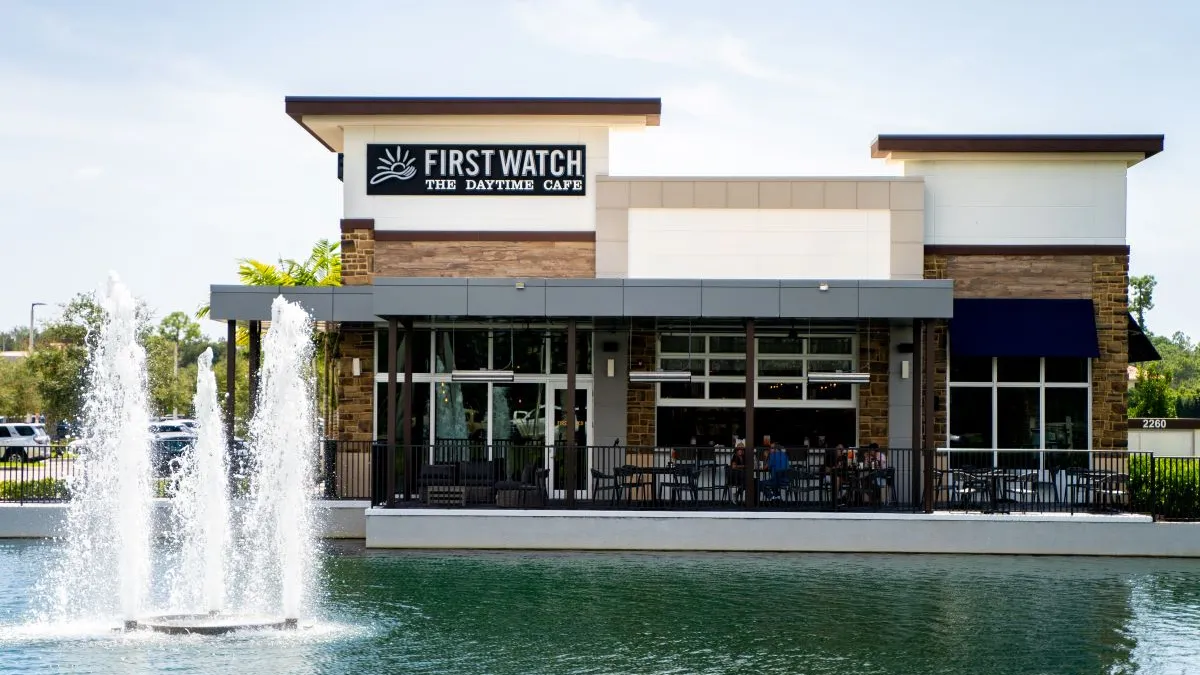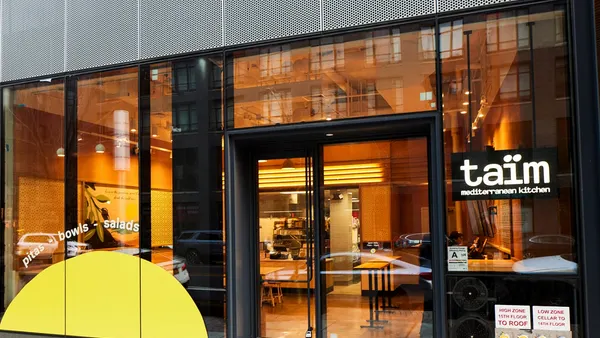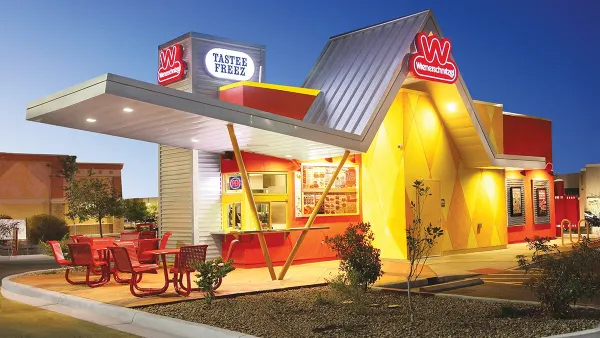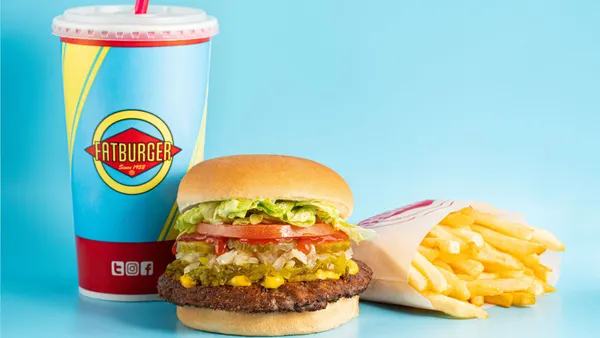This is the first in a three-part series looking into the growth of breakfast concepts.
When First Watch opened its first restaurant 40 years ago in Pacific Grove, California, it was one of few concepts operating solely during the morning daypart. Since then, the company has expanded to over 470 restaurants in 29 states and is one of the fastest growing full-service companies in the country — reaching $914 million in systemwide sales last year.
Breakfast as a category has grown steadily over the past five years, but the COVID-19 pandemic helped attract diners working from home to A.M. concepts in the suburbs, First Watch CEO Christopher Tomasso said.
“Remote working is not going to go back to where it was pre-COVID, and I think we’ll just continue to benefit,” he said.
The restaurant chain’s same-store sales for 2022 rose 14.5% year-over-year and 29.6% compared to 2019, Tomasso said during the company’s March earnings call.
These financial gains reflect the broader breakfast category’s recent performance. Another Broken Egg Cafe’s average unit volumes hit $1.9 million last year compared to $1.45 million in 2018, CEO Paul Macaluso said during the ICR Conference in January.
Restaurant traffic during breakfast and morning snack periods jumped 13% in January compared to a year ago, and 3% compared to January 2020, according to NPD Group data.
“We’ve seen the power breakfast and the weekday daypart growing,” Tomasso said.
Work-from-home office policies helped boost demand Monday through Friday, Snooze Eatery CFO Bill Long said. People have more freedom during their day since they aren’t tied to an office commute, or are working fewer traditional hours so they have more opportunities to go out during the week, Long said.
“The brunch category itself is really an affordable indulgence,” Long said. “I think it really gets into the trend of where people are with their lives with what’s going on with inflation. With time constraints that they [also] have, brunch can be this really light, exciting experience that’s different than going out to dinner.”
Breakfast is also more family friendly and affordable compared to other restaurant meals, Eggs Up Grill CEO Ricky Richardson said. Average checks for Eggs Up Grill are just under $12.
“It's a pretty easy occasion versus … dinner that can at times feel a bit more formal or a bit more structured,” Richardson said. “Breakfast is a little bit more relaxed, a little bit more casual.”
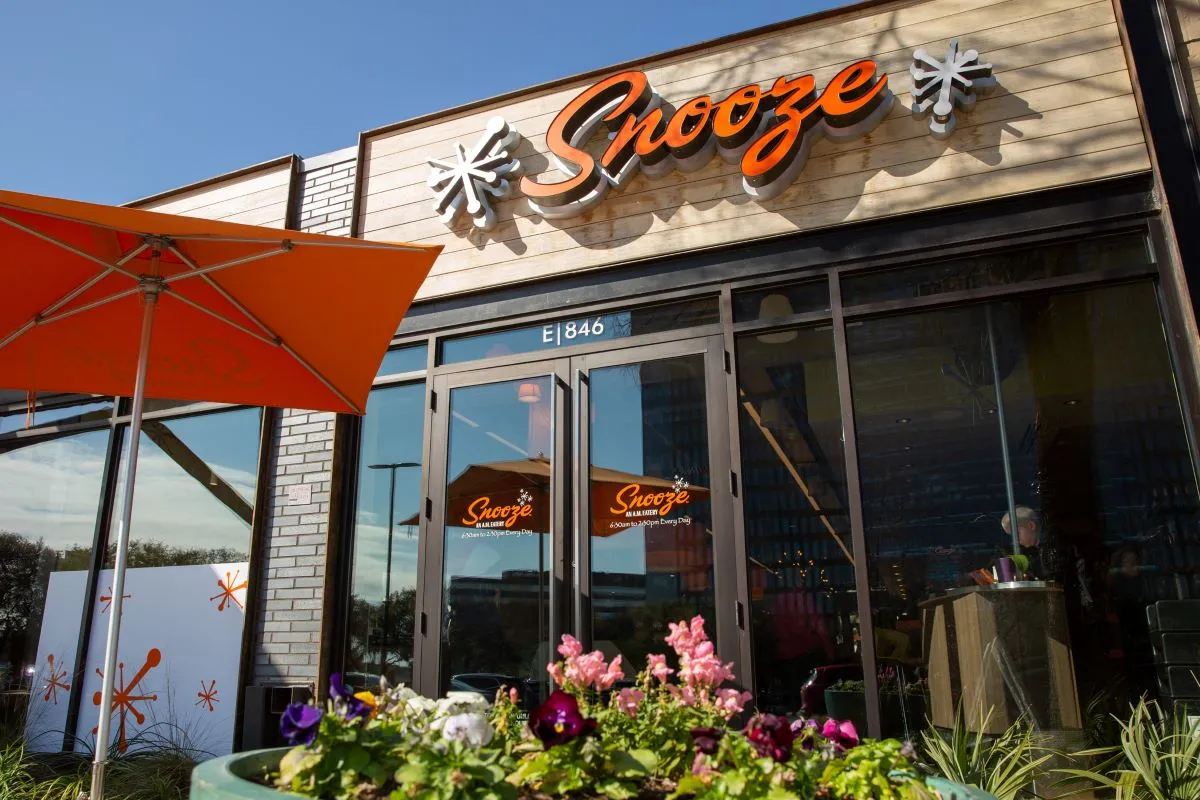
Daypart growth has led to unit expansion
Ongoing demand for breakfast has driven rapid development across the segment. First Watch is growing its footprint by 10% each year, Tomasso said. This year, the chain expects to open between 38 and 42 company-owned restaurants and 10 to 12 franchised locations, First Watch CFO Mel Hope said during the company’s March earnings call.
Famous Toastery has four company stores in the pipeline expected to open by 2024, President Michael Sebazco said, adding that new company stores are allowing the company to redesign its store model. The average size of the chain’s new prototype is around 3,000 square feet and will have dedicated areas for delivery and off-premise. Its previous restaurants ranged from 2,800 to 3,800 square feet.
Another Broken Egg expects to end the year with close to 100 locations and enter its 16th state with its first location in Maryland this year, Macaluso said.
Snooze is targeting 15% to 20% new unit growth on an annual basis, but isn’t franchising to ensure that every unit is the best reflection of the brand, Long said. Snooze plans to open 10 to 13 units in 2023 and expand into new markets, including Atlanta, Nashville and Las Vegas. The company will continue to build out density in newer markets and support infill of existing markets, which include Arizona, Southern California, Colorado, Georgia, North Carolina and Texas.
Much of the success of new builds in the breakfast category stems from careful real estate selection. Snooze usually takes up 3,800 to 4,200 square feet and typically has a 700 square-foot patio. The company likes adaptive reuse projects and creative spaces within urban markets. For example, a Tempe, Arizona, location near Arizona State University is housed within a brick-lined former schoolhouse built in the 1950s. Snooze will supplement units like these with suburban locations to reach more families, Long said.
First Watch has been building larger restaurants in more prominent locations, which helps account for higher AUVs than the low-end strip malls it has operated out of in the past, Tomasso said. About five years ago, it had one or two standalone restaurants. Now, it has close to 20 standalone units. New locations are about 4,200 to 4,500 square feet versus legacy restaurants that have about 3,500 square feet and were largely built in inline and end cap locations.
First Watch works well in second-generation spaces, in particular bar and grill concepts that didn’t make it through the pandemic restrictions. These sites typically have dedicated parking, pickup windows and large patios, as well as indoor/outdoor bars that are more open and inviting, he said.
First Watch opened 43 restaurants last year, including 29 company-owned restaurants. The new company-owned restaurants had AUVs that were 7% above the systemwide average of $2 million, Tomasso said during the company’s March earnings call.
For example, a new restaurant that opened November in Virginia reported week-one sales of $75,000, which rose to $110,000 by the fifth week of sales. This restaurant year-to-date has weekly sales averaging $90,000, surpassing the chain’s previous sales record of $70,000, Tomasso said, adding that the company expects one of its newest restaurants will be its first $4 million restaurants.
Other chains are leaning into franchising as a growth mechanism. Eggs Up Grill, which has roughly 60 units in the Southeast, signed its largest franchise development deal ever with a 30-unit agreement to develop units in Dallas-Fort Worth, and ended 2022 with roughly 15 units open or under commitment, Richardson said. Another Broken Egg Cafe, which has over 80 units across 15 states, has over 70 commitments in the pipeline and added eight new operators with multi-unit commitments to its system last year, Macaluso said.
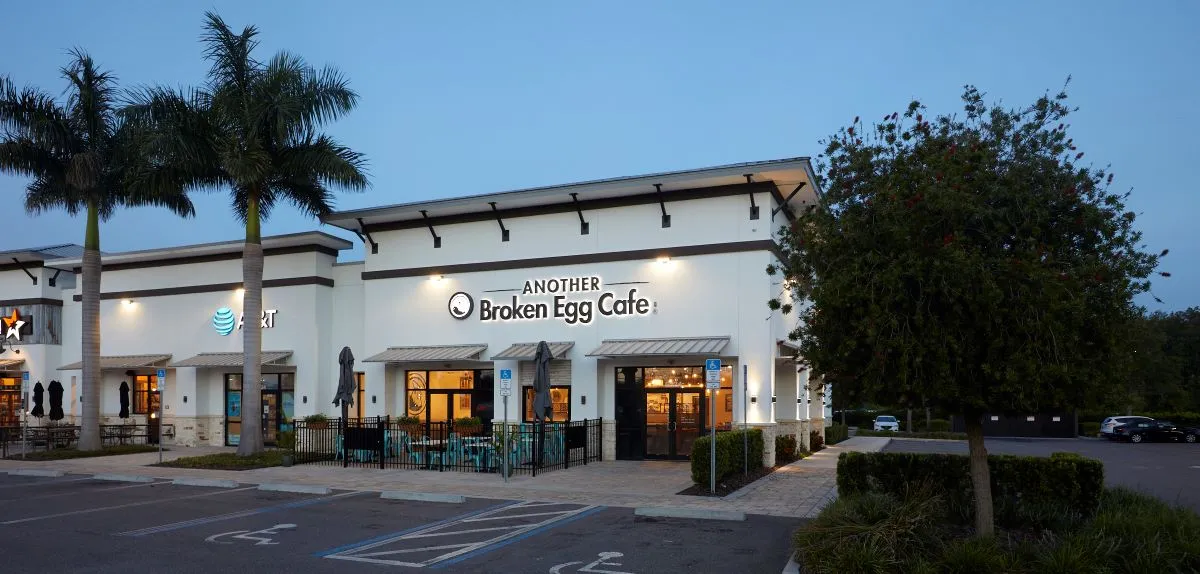
By the end of the year, Another Broken Egg Cafe expects to have a total of 100 units in the pipeline. Of its 30 franchisees, 20 have commitments for future growth, the largest of which is a six-unit deal, he said. The company had been building out its management team over time to support future growth and only had to add one team member to support the 16 new units opening this year.
Currently, 60% of Another Broken Egg Cafe’s restaurants are franchised and 40% are owned by corporate, but that ratio is expected to shift towards 70% franchised stores and 30% corporate stores by 2024, Macaluso said. During March, the brand opened three restaurants. Twenty leases have been signed between corporate and franchisees. Another 13 stores are expected to open this year totaling 16 openings for the year, with the rest expected to open in 2024. The company is already working on 2025 openings, he said.
“When we project that out, we see that the brand has white space to get up to over 1,000 units in the United States over time,” Macaluso said.
To support its franchisee network, which consists of about 12 franchisees, Famous Toastery added a franchise operations manager Feb. 1 and a franchise marketing position last year, Sebazco said. Next, the company will right-size depending on where future development is and how many franchisees it adds, he said.
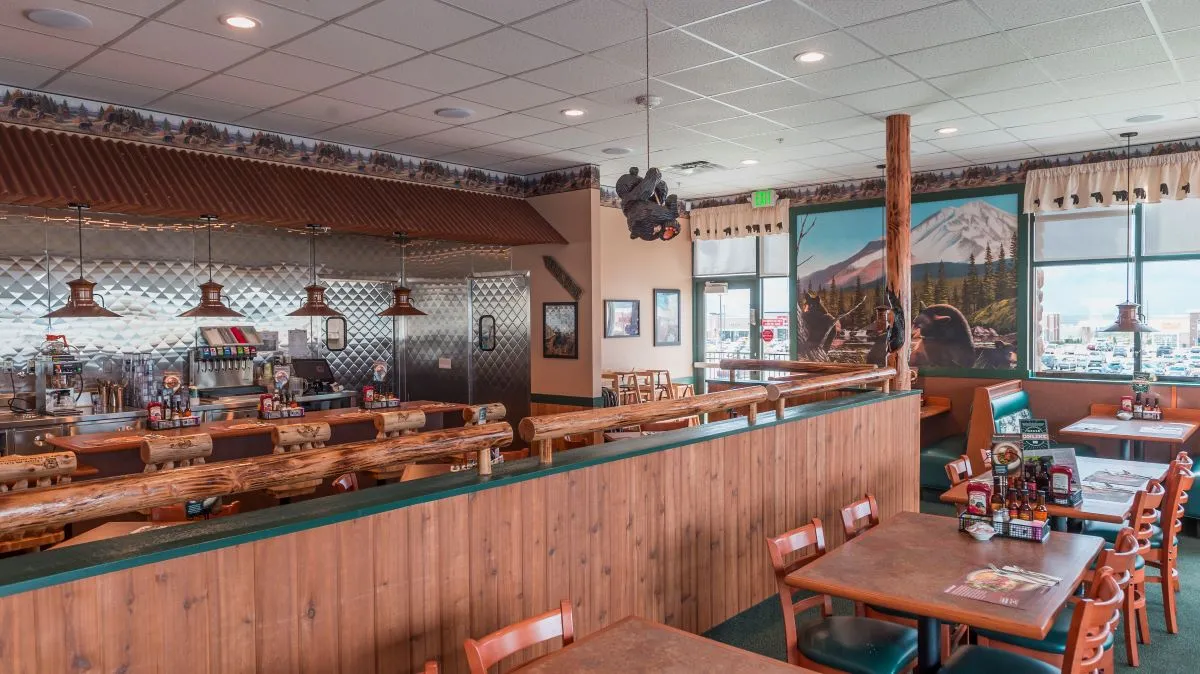
How full-day concepts are competing
All-day breakfast concepts are also benefiting from continual demand in the morning daypart and are developing points of differentiation to compete.
Denny’s bought A.M. eatery Keke’s Breakfast Cafe last year as a way to diversify its portfolio. IHOP is growing its off-premise channels through virtual brands that work alongside its breakfast daypart. Black Bear Diner leans into in-store ambiance as a competitive advantage; each restaurant has carved bears out front and mountain motif murals and a jukebox inside, CEO Anita Adams said.
“With us relative to AM eateries, we are three dayparts. We have a healthy AUV of $2.8 [million]. That is a function of the fact that we do have that dinner component,” she said.
Black Bear Diner, which has over 150 units, had a steady pace of new unit growth, opening 15 to 20 restaurants per year, split between franchised and company-owned prior to the COVID-19 pandemic, Adams said. During the pandemic, the chain didn’t permanently close any units, except one that was unrelated to the economic conditions caused by COVID-19. Black Bear kicked off a renewed development push in mid-2021 and opened 10 units in 2022. This year, it expects to open 15 units and potentially reach 20 to 25 in 2024, Adams said.
Black Bear’s corporate stores are largely in Texas — its first Dallas diner opened in 2022 — and it’s been growing in Houston, where it has about 10 units, Adams said. Franchise partners have largely been focused on the West Coast and California, specifically, while corporate is focused on bringing the band east. The company also has units in Oklahoma and Arkansas, she said.
The company will still target smaller metros that have populations of around 100,000, which do well for the chain given its flexible footprint and broad demographic appeal.
The segment remains healthy as seen by the number of players that have come into the market, even QSRs, she said. Wendy’s, for example, entered the breakfast daypart in 2019 and reached an average weekly sales of over $3,000 per restaurant in Q4 2022.
“Frankly, I love the fact that you’ve got a lot of competitors out there in the breakfast space,” Adams said. “The more breakfast is top-of-mind, we think we’re in that shortlist of selections for guests.”



